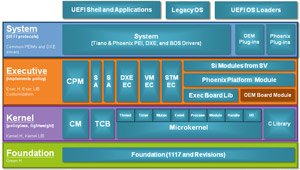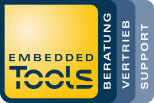 Phoenix Technologies, der führende Hersteller von Core System Software (Firmware + BIOS), stellte die neue Release 2.2 der SecureCore Tiano (SCT2.2) BIOS Firmware in Taiwan vor. Die führende Lösung um Kunden den Umstieg auf modernste UEFI Technologie so leicht wie möglich zu machen.
Phoenix Technologies, der führende Hersteller von Core System Software (Firmware + BIOS), stellte die neue Release 2.2 der SecureCore Tiano (SCT2.2) BIOS Firmware in Taiwan vor. Die führende Lösung um Kunden den Umstieg auf modernste UEFI Technologie so leicht wie möglich zu machen.
SCT 2.2 wurde in vielen Punkten weiterentwickelt:
- Microsoft® Windows® 8 Unterstützung
- Boot Performance Optimeirungen
- verbesserte Systemintegration
- optimiertes User-Interface
- Umfangreicher Support für Peripherie-Chips
- erweitertes Server Management
- Kompatibilität zu UEFI 2.3.1, TCG 1.2/2.0, ACPI 4.0/5.0, USB 3.0, SMBIOS 2.7, und NIST-SP800-147

more details
First, the hardware IRQ (interrupt request) replaces the SMI (system management interrupt) of the legacy USB simulation function. Because there is no need to define the SMI, it will be easy for transplantation and offer wider support for USB devices already available on the market. Second, it supports a wide range of USB 3.0 xHCI controller chips. Third, it features Crisis Recovery for USB2/USB3.0 peripherals. Fourth, it improves compatibility with peripheral drivers through USB driver simulation and recognition of the SCSI instruction set.
Phoenix SCT adds new boot devices/run-levels: first, UEFI boot driving the SCSI device directly from the legacy One-time PROM (OPROM), with maximum capacity of each boot partition reaching 2.2 TeraBytes; second, embedded system boot for the SD card, SD I/O interface port and CF ATA memory card; third, UEFI LAN boot from the network interface card; and fourth, legacy SA OPROM from the motherboard; and fifth, OPROM boot from additional interface cards.
For other support, it redesigns the entire firmware code, clearing all confusing and clumsy platform codes to offer a simplified architecture for platform transplantation. It automatically indicates CMOS information and generates related codes during the building process.
Phoenix SCT 2.2 also supports WinHost64 to execute 64-bit applications under the 64-bit Windows environment. And the design of the kernel simplifies the code, with capability of supporting prototypes of new versions of architecture. As for debugging, it features SBCS (single-byte character set) or DBCS (double-byte character set) Port 80 Enhanced PostCode output during driver input.
Finally, the enhanced Milestone Task will easily achieve modularized customization without any previous versions being overwritten or fallen into disuse. In terms of embedded functions, it offers ATX power supply simulation to simulate legacy AT power supply hardware switch functions. It also supports multiple Serial I/O chips, two-phase password input, headless function without video, and recoverable errors.


 Das Embedded BIOS®
Das Embedded BIOS®  Phoenix Technologies, der führende Hersteller von Core System Software (Firmware + BIOS), stellte die neue Release 2.2 der
Phoenix Technologies, der führende Hersteller von Core System Software (Firmware + BIOS), stellte die neue Release 2.2 der